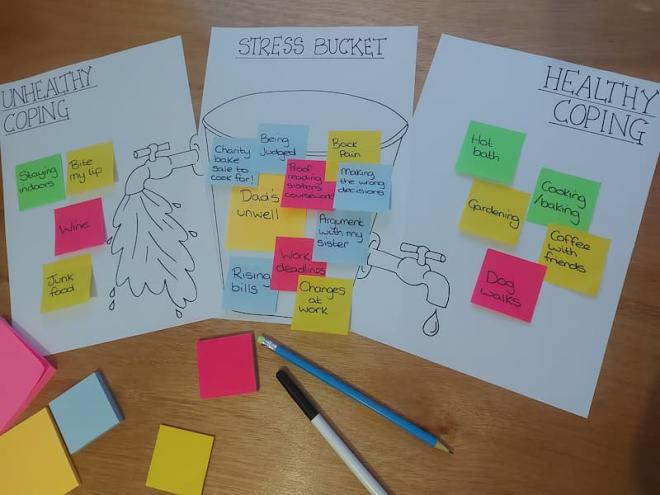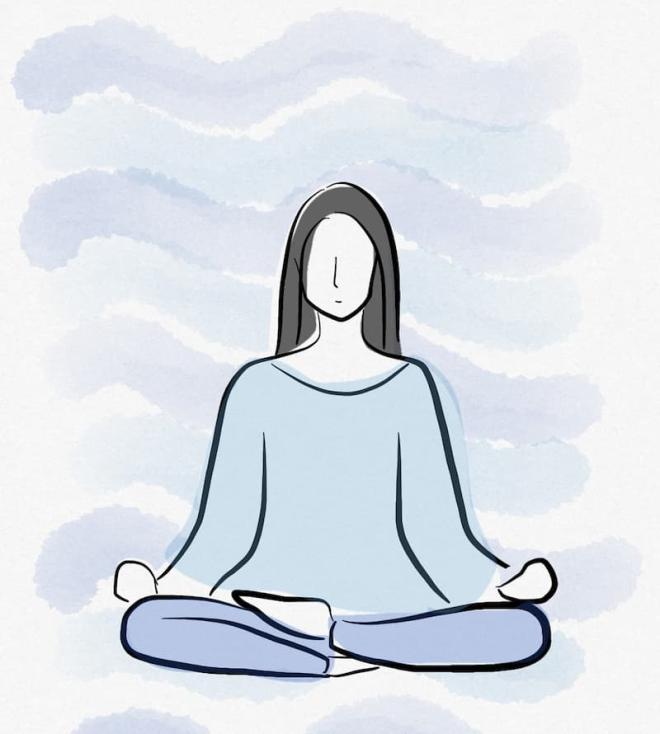
learn to stop stress
You might not know this but April is stress awareness month and Active8 are using this as an opportunity to talk about stress and mental health.
Read on to find out our top tips for managing stress.
What is stress?
It is completely normal to feel stressed. After all, it’s a warning system dating back thousands of years. It’s what triggered and still triggers people’s “fight or flight” response to danger.
In a modern society, we still all feel stress but these stresses have changed to reflect the world we live in. In 2023, you’re more likely to be stressed about the rising cost of living than you are about being attacked by a Saber Tooth Tiger!
Common stresses can range from paying bills to arguments with friends, from difficulties at work to coursework or exams.
There is definitely still a place for a little stress in our lives. I remember at College, I’d leave bits of coursework until the week it was due because I needed a little stress to motivate me to get it done! This is an example of useful stress.
But stress is also EXHAUSTING!
When stress levels become too high or if you are stressed for too long, this can have a big impact on your mental health AND your physical health… it can lead to you feeling more tired, being restless, being irritable, having headaches, or feeling sick.
We can’t avoid all stress but there are things we can do to manage stress levels and keep them in check. Take a look below at our suggestions for helping manage stress… they might not all be for you but why not give them a try?
What you can do about stress?

The stress bucket
First things first… do you even know what is causing your stress? Sometimes it’s one obvious stress but other times it can be a complex mixture of lots of different things that builds up… the obvious thing might just be the one that tipped you over the edge.
Taking time to sit and think about what is causing you stress is the first step to managing it. Try this… imagine a bucket inside you that holds all your stress.
The size of the bucket depends on how much stress you can hold. Some people’s bucket will naturally be larger than others and that’s okay. Everyone’s capacity to cope with stress is different.
Imagine the stress in your life is like water being poured into the top of the bucket. To begin with this is fine… it’s a bucket… holding water (or in this case, stress) is what it’s designed to do.
BUT the stressed readers at this point have already thought to themselves “my bucket isn’t big enough” and no doubt have imaged an overflowing bucket that is spilling out over the top because there is too much stress to try and hold.
When the bucket overfills, this is when things become overwhelming. It starts feeling too much and you end up frantically trying to mop up uncontrollable puddles. This is called burnout.
The trick is to find ways to stop that from happening and managing stress before it reaches the top of the bucket.
1. Draw your stress bucket on a piece of paper
Filling an A4 page is a good size but you can make it bigger or smaller depending on how well you cope with stress. You can even change the colour or decorate the bucket if you like, it’s YOUR stress bucket.
2. Add stress to your bucket
In your bucket, write down ALL the things that are causing you stress at the moment. If something is a really big stress, you might even want to write this a little larger to reflect that.
Don’t feel overwhelmed at this point! Seeing it all written down can sometimes seem daunting but remember: you haven’t added to your stress, this was all there before it’s just more organised now.
3. Add taps to your bucket
Draw one tap each side of your bucket (one high up and one low down). You can use extra bits of paper to give you more space, if needed.
These are your coping taps. They represent the ways you cope with stress and ways you have learned to let stress out of the bucket to stop it overflowing.
Label the higher tap “unhealthy coping” and the lower tap “healthy coping”.
4. Add your unhealthy coping strategies
Under your “unhealthy tap”, write down all the not-so-great things you do to stop your stress bucket overflowing. These are the things that might work to stop you getting to crisis point, but they’re not things that a doctor would really recommend.
Examples of unhealthy coping might be:
- Drinking alcohol
- Smoking
- Overeating or undereating
- Sleeping too much or too little
- Snapping at or being grumpy with others
- Staying indoors
- Withdrawing from friends
- Taking unprescribed drugs (including sleeping tablets because you’re not sleeping properly)
- Biting your nails
- …or you might think of some others that I didn’t!
5. Add your healthy coping strategies
Now list all the healthy things you do (or things you think you could do) to help manage the stress in your bucket.
Examples of healthy coping might be:
- Talking to friends and family
- Writing a diary
- Exercise
- Drawing or colouring in
- Reading
- Playing with pets
Coping with stress

Every person is unique and it’s therefore logical that each person will deal with stress differently. What you find stressful, others might not, and that’s okay. There will be other things that they find stressful that you won’t.
Even if you’re currently not feeling high stress, now is the time to learn how to keep it that way. Likewise, when we’re stressed it’s not always easy to take on new information so having these tips in your back pocket now might be just what you need further down the line.
If stress gets overwhelming, there is specialist support available. You can reach out to friends, family, your GP, Samaritans, (by calling: 116 123 or emailing: [email protected]), or dial 999 if you are in crisis. And (of course) Active8 staff are always here to listen and signpost you toward any support we think may help.
If you drew your stress bucket and struggled to come up with healthy coping strategies, here’s a few suggestions to get you started…
Take time to think about stress
Use something like the stress bucket exercise to identify what stresses you have and how big each stress is – sometimes this simple task can help put your stress into perspective.
Sometimes writing it down can help you get organised when you can’t make sense of everything you have to think about. Taking control of your stress can be empowering and motivating.
Think about which of these are now problems and which can (temporarily) be put on the back burner to revisit at a time of less stress… just remember to go back and revisit these when you can or your back burner will start clogging up too.
Think about which stress is easily fixed. Can you do something quick to remove one of your stresses altogether? Or can bigger stresses be broken down into more manageable sized things? If so, that can be an easy place to start.
Make time to talk
They do say that a problem shared is a problem halved.
Sometimes all you need is a good friend to tell you that it will all be ok in the end. To listen to your worries. Or just to give you a massive hug!
Perhaps they have been in a similar situation before and might be able to offer some advice or suggestions that helped them? If that’s what you need then ask!
Talking is particularly important if you’re stressed about friendships, relationships, or family. Be brave and open up to people about how you feel. You never know, you might be stressing over nothing…
I remember a really stressful time at College when I was being ignored by a good friend and I had no idea why! After months of stressing about it, I finally asked her and it turns out she had been ignoring me because she was upset that I had been ignoring her! At which point we both laughed and everything returned to normal.
Keep time for you
This is such a hard one to do, especially if part (or all) of your stress is feeling like you have too much to do and not enough time to do it in.
I’m sure we’ve all worked through our lunch break on occasion on the lead up to a deadline… but has this become every day?
Do you get home from work, do nothing but chores and then go to bed?
When you have lots to get done it might seem counter-intuitive to stop for a while BUT if you are able to relax and manage stress levels, this can help you focus and be more productive when you then carry on with the tasks you need to do.
Even if it’s 10 minutes a day, do something that you enjoy… read a chapter of a book, listen to some music, do some colouring in, do a bit of gardening… find something you enjoy but remember to avoid relying on unhealthy coping strategies.
Be active
Being active can be a really healthy way to manage stress. For some people this can be going for a run, going to the gym, or other people may need a lower impact exercise like going for a swim or a walk.
Exercise releases endorphins in your body which can help reduce and manage stress. It’s also a great way to get out the house and have a change of scenery.
Challenge yourself and set yourself goals which get increasingly more difficult so that you’re always pushing yourself. And remember to aim for 20-30 minutes of exercise a day.
If you have complex health conditions, that shouldn’t be a barrier to exercise! Always follow the advice of your GP in relation to exercise and consider asking the advice of a personal trainer who can find ways to make exercise accessible for you.
Keep an eye on our Active8 blog for an upcoming article about exercise hints and tips for wheelchair users.
Read next
There are loads of resources out there to help you find healthy ways to manage stress, but you might have to try several different things before you find the one that works for you.
Try this 5-question quiz that could help identify the best stress management techniques for you.
Try breathing exercises for stress.
Does having a disability make you more stressed?
Keep an eye on our Active8 blog for an upcoming article about exercise hints and tips for wheelchair users.

About the author
I’m Lindsey. After 3 years as a volunteer for Active8, in January 2020 I secured my position working for the charity as a Project Coordinator.
My role involves working with disabled young people across Cornwall to build their confidence, plan and deliver a range of independent living sessions, organise activities to encourage friendships, and provide the group with opportunities to try new things.
I'm new to blogging but Active8 has taught me to be bold, get stuck in, and try new things!
The small print made big
The Active8 blog is designed as a platform for our members and the disabled community to share their personal experiences and discussions which they are passionate about. Any views and opinions expressed are those of the writer and do not necessarily reflect the views of our charity.
To the best of our knowledge, the information in blog posts was accurate at the time of publication. Please contact the Active8 manager if you believe any content is incorrect or if you consider any content to be offensive or inappropriate: [email protected]
Where information in blogs has been taken from third party sources, every attempt has been made to give appropriate credit.
From time to time, writers may receive sponsorship, cash payment, free products, services and/or other forms of compensation from companies and organisations that they promote. Active8 will accept no form of payment for blog content or advertising.
Unless otherwise stated, our blogs (and any links they may contain) are not written or reviewed by medical professionals and do not provide health/lifestyle advice. They are not suitable for medical advice, diagnosis, or treatment. Any suggestions these blogs contain are based on the writer’s personal experience. Should you have any concerns about your health (including mental health) then we advise you should speak with your GP or consultant, in the first instance, or call 999 in an emergency.







